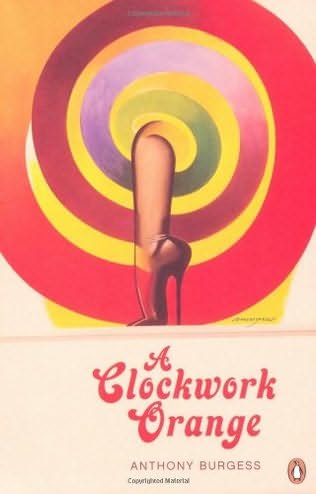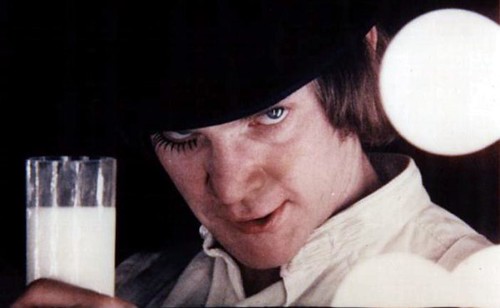Thursday, March 27, 2008
This is why
Although I felt that my hypothesis as to the meaning of the title was accurate, I knew I should do some research to see what other people thought, possibly including Anthony Burgess himself. The first source I came upon said that the term was meant to mean anything queer, strange, or unusual. Other than Alex’s mannerisms and the awkward slang used throughout the novel, I couldn’t see much of a connection to the title since those three adjectives have nothing to do with the plot. Also included was a quote from Burgess from a Rolling Stone article that read, "The title of the book comes from an old London expression, which I first heard from a very old Cockney in 1945: 'He's as queer as a clockwork orange' (queer meaning mad...). I liked the phrase because of its yoking of tradition and surrealism, and I determined some day to use it." Maybe if I were British I would understand it better. This can be associated with the maddening nature of the novel and how crazy the idea of messing with free will is. Traditionally, when something is referred to as “clockwork”, it can be noted as automatic because it sticks to a schedule and is persistent. So now, “orange” is most likely something that interferes with the clockwork. The more I thought about the meaning, I began to understand what Burgess was trying to do. Since the whole novel is written in an odd vernacular, the title probably was meant to blend in with the rest of the novel and be part of the slang. As I was reading the novel, I gradually learned what each of the words meant based on how they were used in context; therefore, I would need “a clockwork orange” to be used more in context to decipher its meaning. It was used very little in the novel so I decided to consult another source. The best definition for “a clockwork orange” was “[something with] the appearance of an organism lovely with colour and juice but is in fact only a clockwork toy to be wound by God or the Devil.” This explanation depicts Alex after his cure perfectly: he is a character with the qualities of a human being but can only act according to how his treatment allows him. Alex lost the ability to choose, although it appears as if he chooses to do good all the time. This definition must have been the translation from old London vernacular that Burgess was referring to.
Monday, March 24, 2008
Why A Clockwork Orange?

Something about A Clockwork Orange that has been spurring my curiosity for the past couple days is the meaning of the title. While I was reading the book, I wasn’t able to make any connections with the storyline and the title, other than the fact that a man in the novel was writing a book called “A Clockwork Orange”. An excerpt from the book read, “The attempt to impose upon man, a creature of growth and capable of sweetness, to ooze juicily at the last round the bearded lips of God, to attempt to impose, I say, laws and conditions appropriate to a mechanical creation, against this I raise my swordpen”. Anthony Burgess must have added this segment for a reason, that which would explain the meaning of the title. Obviously these few lines have their similarities with the novel as a whole. “The attempt to impose upon man” refers to the doctors altering Alex’s actions through his conscience with the gruesome movies and medication. This imposing of laws and conditions would only be appropriate for a mechanical creation or something not human. So the excerpt is related to the plot of the novel, but what does it have to do with the title? I believe “clockwork” refers to change so that must deal with series of changes Alex went through over the course of the novel. “Clockwork” refers to change since people can either progress or regress as time goes on. “Orange” is the part of the title that is extremely vague. I think Burgess meant for it to mean something unnatural, but how “orange” can be connected with force and imposition is unclear. The most logical connection I came up with dealt with fire. Since fire is orange and flames are often associated with hell, maybe “A Clockwork Orange” translates to a change that is not permissible by God. The cover of the book adds evidence to this hell theory. Half of a face is depicted with the mouth screaming and flames coming out where the upper half of the face would be. The context and a major theme of the novel, free will, which I have touched upon in previous blogs, adds even more evidence that my theory is correct (or at least somewhat accurate). Free will dealt with the question of what God’s intentions were for us and whether the tampering with the free will of others is in His plan. If “A Clockwork Orange” had a synonym, I could say that it would be “An Ungodly Metamorphosis” based upon my assumptions.
Wednesday, March 12, 2008
A Happy Ending?

I have just finished A Clockwork Orange and it did not end the way I thought it would. At the end of the second section I thought that Alex would become an example for what the government was doing and die as a martyr or live on unhappily. The government was trying to play the role of God and tamper with the free will of people. It was turning out to end like that when three men opposed to the current sitting government came into contact with Alex and were planning to use him as an example to bring the party out of power in the next election. However, it turned out that they wanted him to kill himself so that people would see how inhumane the treatment really was and that the party was behind it. When all was said and done, Alex was cured of his inability to choose, and returned to the way he was before he was imprisoned. At the very end he decides that he has grown too old for his childish behavior and wants to find a girl to marry and live a normal life with. What now comes into question is whether Alex matured by his own free will or whether the “cure” he received in prison had any influence on him. I looked into the author’s religion to find this answer. Burgess’ faith lies somewhere between Pelagianism and Augustinianism; both are stemmed out from Catholicism. The two faiths state that God has created us, but has no influence on the way we carry out our lives. He has laid out the law for us and we can choose to follow it or reject it. If this is true, then the government has not interfered with free will since they were given the choice. One can also say that Alex had his choice before he was sent to prison, and he acted by denying God’s law and taking the life of another. However, the punishment did not fit the crime. I do not believe that the government interfered with Alex’s free will in the long run. After he was stripped of his free will, he regained his ability to choose and went back to being a thug. Nevertheless, it appears he grew out of that stage and realized that there was more to life than roaming the streets.
Wednesday, March 5, 2008
What is free will?
This book really has not turned out to be anything that I originally thought it would be: a tale of a young man who causes trouble and eventually learns a lesson. It has now become a question of morality. Normally I would like to avoid the topic of God and what He wants for us, but due to the nature of the novel, that has now become a major concern.
A little background should be given of the recent plot developments before I dive into this controversial question. Alex has recently been captured by the police and thrown into jail for murder. While in jail, he works with a minister and learns little tidbits about the Catholic religion. Just as it looks as if things are shaping up and he will be released soon, Alex kills another prisoner in his jail cell, and the impending light is shut off. He is given the opportunity to become a guinea pig for a new “cure” for the motives behind violence. This is where the question of God’s plan comes into action. The doctors and prison personnel educate him through association. Alex is forced to watch horrible movies of people being killed and tortured. The purpose behind this, is so that when he goes to commit the acts that he had done before, he will feel sick and not want to do it. His free will is forcibly being changed for the good of society. Alex is released from prison back into society after the “cure” is completed. By definition of Catholic doctrine, free will “has commanded [man] to obey the moral law, and has promised to reward or punish him for observance or violation of this law, made the reality of moral liberty an issue of transcendent importance”. From my interpretation, this means that God has created a moral law for man to follow, and he has the choice of whether or not he wants to follow this law. The moral liberty is that man has the choice to follow the law or not. By doing what the doctors have done in A Clockwork Orange to Alex, they have taken away that moral liberty of choice. The doctors think that God would want all of man to be good and follow the righteous side of His moral law, but they are wrong according to Catholic doctrine and my own opinion. I cringed when I was reading that Alex was being forced to act a certain way, even though the other is unacceptable in society. Another source that I found claimed that teenagers do not have the proper morality to make their own decisions, because those morals are still being developed. This is completely false. People of every age have the ability to make their own decisions. Even though teens sometimes don’t make the best decisions, they should not be rectified by a bunch of men in white lab coats. God has intended for everyone to develop their own morals, without the forcible influence of others. Tampering with morality is tampering with free will, no matter the age of the subject.
A little background should be given of the recent plot developments before I dive into this controversial question. Alex has recently been captured by the police and thrown into jail for murder. While in jail, he works with a minister and learns little tidbits about the Catholic religion. Just as it looks as if things are shaping up and he will be released soon, Alex kills another prisoner in his jail cell, and the impending light is shut off. He is given the opportunity to become a guinea pig for a new “cure” for the motives behind violence. This is where the question of God’s plan comes into action. The doctors and prison personnel educate him through association. Alex is forced to watch horrible movies of people being killed and tortured. The purpose behind this, is so that when he goes to commit the acts that he had done before, he will feel sick and not want to do it. His free will is forcibly being changed for the good of society. Alex is released from prison back into society after the “cure” is completed. By definition of Catholic doctrine, free will “has commanded [man] to obey the moral law, and has promised to reward or punish him for observance or violation of this law, made the reality of moral liberty an issue of transcendent importance”. From my interpretation, this means that God has created a moral law for man to follow, and he has the choice of whether or not he wants to follow this law. The moral liberty is that man has the choice to follow the law or not. By doing what the doctors have done in A Clockwork Orange to Alex, they have taken away that moral liberty of choice. The doctors think that God would want all of man to be good and follow the righteous side of His moral law, but they are wrong according to Catholic doctrine and my own opinion. I cringed when I was reading that Alex was being forced to act a certain way, even though the other is unacceptable in society. Another source that I found claimed that teenagers do not have the proper morality to make their own decisions, because those morals are still being developed. This is completely false. People of every age have the ability to make their own decisions. Even though teens sometimes don’t make the best decisions, they should not be rectified by a bunch of men in white lab coats. God has intended for everyone to develop their own morals, without the forcible influence of others. Tampering with morality is tampering with free will, no matter the age of the subject.
Subscribe to:
Comments (Atom)



